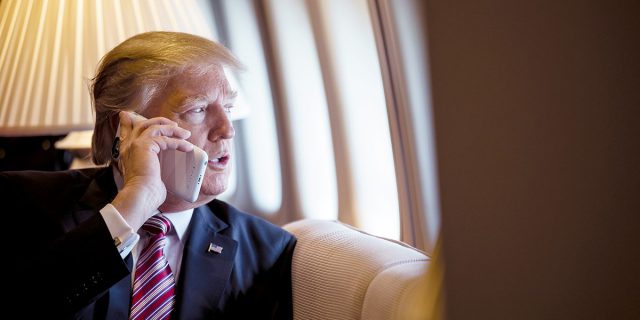US–Iran: the POTUS with the mostest

Herewith, nine conclusions to be drawn from President Donald Trump’s decision to withdraw the United States from the Joint Comprehensive Plan of Action (JCPOA) with Iran.
POTUS runs the show
As the President told Fox News’ Laura Ingraham last November: ‘Let me tell you, the one that matters is me … I’m the only one that matters, because when it comes to it, that’s what the policy is going to be. You’ve seen that, you’ve seen it strongly.’
He wasn’t kidding. Trump was twice talked out of walking away from the JCPOA by Defence Secretary Jim Mattis and National Security Council staff before John Bolton took over. It’s hard to think of a weaker Cabinet in modern American presidencies. This isn’t necessarily bad if one can rely on the President’s sound judgement, but Trump looks to decide on gut instinct rather than carefully balancing options.
It’s a two-speed administration
Trump isn’t a details guy and there’s much going on in American public administration in Washington DC that looks every bit like past administrations. US officials are masters at interagency policy development, which we can see in the National Security Strategy, among many documents.
The risk is that when the President pays attention, he won’t hesitate to cut a Cabinet secretary off at the knees if the policy looks like a ‘bad deal’. Happiness in Washington is to work in policy areas the President doesn’t really care about.
Trump is erratic but consistent
We can’t say we weren’t warned. Trump proclaimed that he was going to get rid of the Trans-Pacific Partnership; kill NAFTA and get rid of the JCPOA, which according to the President was ‘one of the worst and most one-sided transactions the United States has ever entered into’.
There’s something to be said for a political leader implementing his election platform. While Trump is a policy weathervane on many issues, he has been consistent on the JCPOA from the get-go. What a pity the European signatories didn’t think about how they might try to accommodate some of Trump’s quite reasonable concerns about flaws in the agreement.
Trump has a big appetite for risk
A more cautious President might have stuck with the JCPOA but pushed to get international consensus to pressure Iran on missile technology development, support for Hezbollah, and its destructive presence in Syria, Iran, Lebanon and Yemen. Not Donald.
The Iranians have responded to his action by saying they’re preparing to restart uranium enrichment. That would lose them whatever residual support they may have in Europe for the JCPOA. Trump has raised the stakes. He embraces risk in ways that American presidents have avoided since Richard Nixon.
JCPOA had too many flaws to survive
At best the JCPOA was a flawed agreement. It kicked Iran’s nuclear weapons program further down the road, which was valuable but more a delaying mechanism than closing off Tehran’s nuclear aspirations. The agreement’s inspection mechanisms were inadequate, especially on covert military programs. Worst of all the agreement looked the other way while Iran made a play to become the Middle East’s dominant great power.
That was a good deal for Iran: it entered the JCPOA within a 12‑month sprint of acquiring a nuclear weapon. It could exit the agreement a decade later, still within the 12‑month sprint but with a much stronger strategic position in the Middle East. President Trump is right to say that this was a bad deal, but now it’s up to him to deliver something better.
Iran has no real option other than to renegotiate
It will be impossible for Tehran to resume uranium enrichment without bringing down international sanctions on itself far more effective than those before the JCPOA. (The North Korean experience has shown how to apply sanctions more effectively.) Trump is also tickling a nerve the ayatollahs will hate about domestic opposition to their regime, which could be sharpened by stronger sanctions.
The Iranians will realise that Trump is a tougher nut to stare down than Barack Obama. Yes, it’s risky, but Iran doesn’t have the whip hand and might conclude that it would be better to talk rather than risk Donald’s unpredictability.
This could bring to a head the simmering confrontation between Iran and Saudi Arabia
It could get ugly from here. If Iran decides it needs to sprint to a nuclear capability, the Saudis won’t sit back to watch it happen. And while Trump is raising the pressure, the Saudis may decide that now is the time to try to put an end to Iranian ‘influencing’ in the region. We may see the risk of state-on-state conflict between the two regional giants and a heating up of the already hot proxy wars happening in Yemen and elsewhere.
Cutting a deal with Kim Jong‑un just became harder
The North Koreans will be in an agony of indecision. They may have hoped that something like a JCPOA was theirs for the asking. They have a better sense now of the price Trump will want to extract for any agreement. Can Kim countenance such intrusive inspections of his nuclear facilities to verify real and irreversible denuclearisation?
America’s allies must rethink how they deal with Trump
We should have got this point a long time ago. Foreign ministries around the world slumped into an extended period of denial that Obama had really left the building. Surely the sweet blandishments of Boris Johnson on Fox News would make the President see reason?
But Trump is a different breed of cat: a big, ginger Cheshire cat, no doubt grinning from ear to ear in the White House. We all need to start dealing with him on his terms if there’s any hope of shaping the President’s world view.
